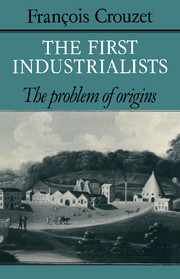3 - The Myth of the Self-Made Man
Published online by Cambridge University Press: 25 October 2011
Summary
During the nineteenth century, it was widely believed – this in itself is an interesting cultural and social phenomenon – that industrialists were mostly self-made men. Born ‘in humble circumstances’ (this is a standard expression), i.e. from modest or even poor families, they had started life as wage-earners, often working with their own hands; but, thanks to hard work, thrift, mechanical ingenuity and character, they had been able to set up their own business, to develop it and eventually to become wealthy and powerful. The paternity of these views is often imputed to Samuel Smiles, in his best-seller Self- Help, published in 1859, and reference is frequently made to ‘the Smilesean myth’.
Actually, this myth is much older. Without going back to the folk symbol of Dick Whittington and to some seventeenth-century writings, in the eighteenth century, as Walter Minchinton has observed, ‘the popular archetype’ of the merchant ‘was that of the self-made man who by his own efforts acquired a sufficient competence to set up as a merchant and died fantastically rich’. Such views were current, for instance, in Manchester, where a local writer stated in 1756: ‘I hardly know one single instance of a large Fortune gain'd in Town, but the Man who laid the Foundation of it, was of very inferior Substance.’ In 1785, it was written of Mancunian manufacturers: ‘By much the major part, and even the most wealthy among them commenced their careers in business with but slender capitals … Patience, industry and perseverance was their principal stock.’ In Birmingham, by 1760, Samuel Garbett and John Baskerville were looked on as self-made heroes who were much admired by visitors to the town.
- Type
- Chapter
- Information
- The First IndustrialistsThe Problem of Origins, pp. 37 - 49Publisher: Cambridge University PressPrint publication year: 1985

